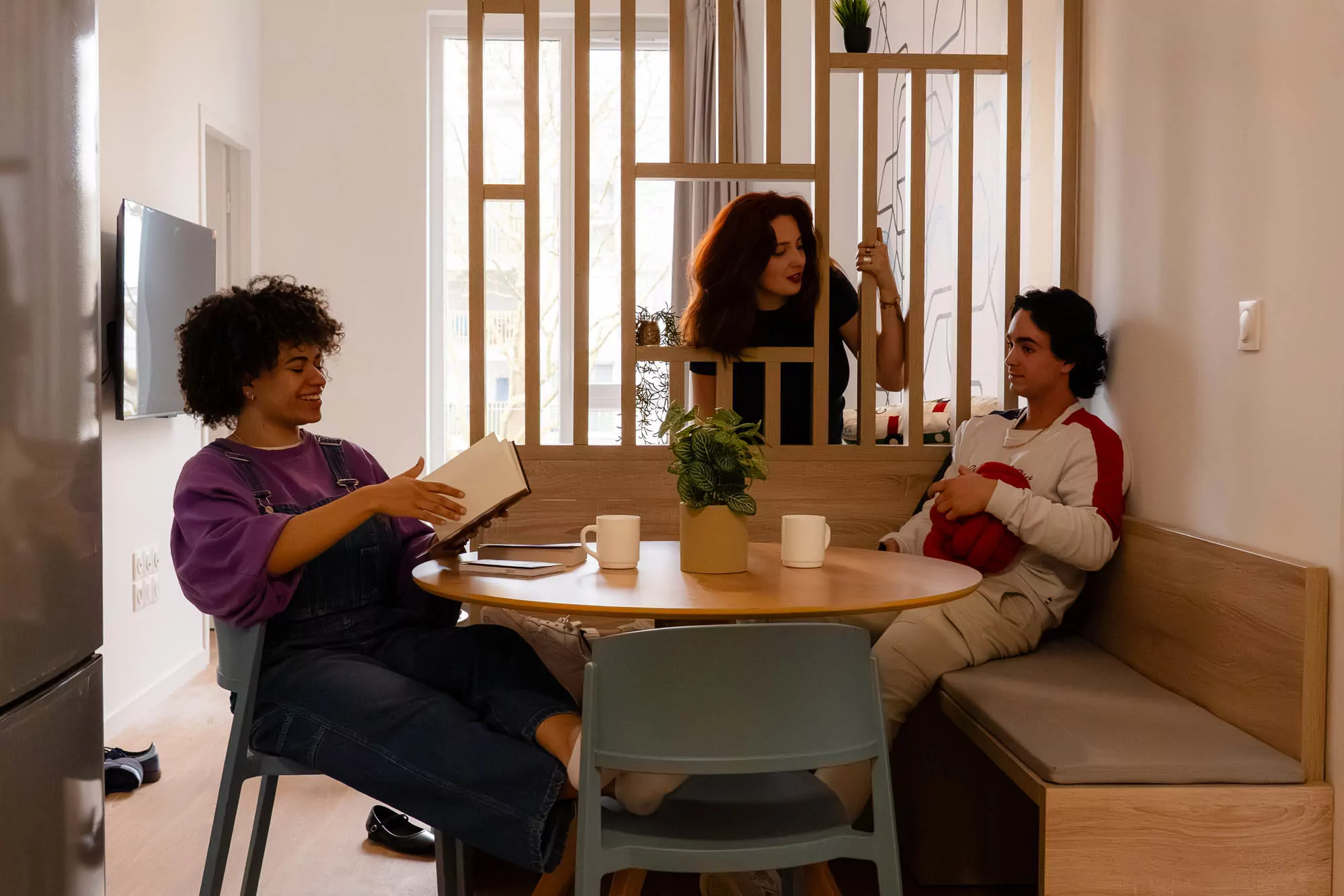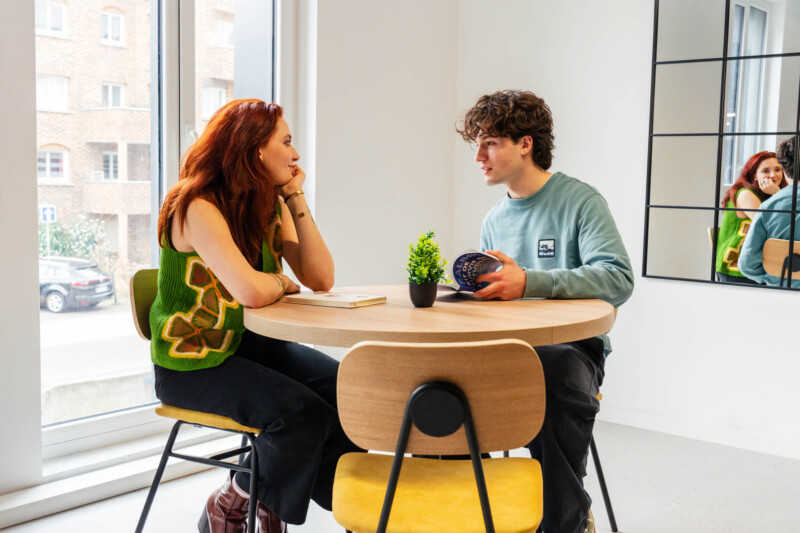Student Flatsharing : The Complete Guide to Finding and Succeeding in Your Flatshare
Student flat-sharing offers you more than just shared rent: it provides a pleasant living space, opportunities to meet new people and a simpler everyday life. Discover all our tips for finding and making a success of your flat-share in this guide.

Student flatsharing has become one of the most popular housing solutions for young people in France. Sharing a flat or house with other flatmates not only helps reduce rent but also offers a friendly and dynamic environment.
Whether you’re looking for a room in a well-located residence in the city centre of Paris, Strasbourg, or Brest, or you’d prefer a large furnished apartment with a balcony, this guide will help you understand everything about flatsharing: benefits, procedures, rights, costs, and tips for living well together. More and more young people are choosing this type of rental to enjoy better comfort/space and easily meet other students in France.
Whether you opt for a spacious home in the city centre or a charming house in the suburbs, you’ll always find available options that suit your budget and preferences.
💡 Tip: To get a more attractive price, look for flatshares slightly outside the most expensive district while staying well connected by public transport.
Why Choose Flatsharing as a Student?
Choosing a shared rental means opting for a more economical and more social lifestyle. By sharing accommodation with several people, you can enjoy more space and better-equipped rooms than in a studio, sometimes with more square meters for the same price. It also allows you to split expenses: rent, water, electricity, internet—everything is shared, making the room or flat more affordable.
If you search carefully, you might even find a house or furnished apartment with a balcony, offering a nice outdoor space to relax after class.
Beyond the savings, flatsharing offers you the opportunity to make new friends, share meals in the equipped kitchen, organise evenings in the living room, or help each other study. In cities like Paris or Strasbourg, where individual student housing is very expensive, flatsharing lets you stay close to your university, school, or city centre.
💡 Tip: Ask if the bed and furniture are already included to avoid extra costs.
The Different Types of Flatsharing
Several flatshare options exist to suit your needs and budget:
- Classic student flatshare: You share a furnished or unfurnished apartment with other students, each having their own bedroom while sharing common areas such as the equipped kitchen and bathroom.
- Solidarity flatshare: You live with people of different ages or situations, often within a non-profit setting, to create intergenerational bonds or help someone in exchange for a reduced rent.
- Flatshare in a student residence: Like those offered by UXCO Student, where you have your private bedroom and modern shared spaces (study rooms, gym, terraces, lounges). Included services make life easier: Wi-Fi, cleaning of shared areas, parcel reception…
- Furnished flatshare: Accommodation already equipped with a bed, desk, equipped kitchen, and sometimes a balcony. All you need to do is unpack your bags.
💡 Tip: To optimise your budget, compare the price per person in several flatshares and check what is actually included. Some ads are posted directly by private landlords, which can make communication and negotiation easier, especially if several rooms are still available.
Flatmates’ Rights and Responsibilities
Living in a flatshare means respecting a legal framework and rules for harmony:
- The lease: It can be individual (each tenant signs their own contract) or joint (everyone signs the same lease and is collectively responsible for rent and charges).
- Security deposit: Often equivalent to one month’s rent for an unfurnished property, two months for a furnished one.
- Charges included or not: Water, electricity, heating… sometimes included in rent, sometimes paid separately.
- Guarantor: Often required by the landlord, this can be a private individual (family) or a scheme like Visale.
- House rules: Respecting everyone’s sleep, keeping the kitchen and shared rooms tidy, fair division of chores.
💡 Tip: At UXCO Student, charges are included in the rent, avoiding unpleasant surprises and making budgeting easier. Don’t forget you may be eligible for housing aid depending on your situation, making your rental even more affordable—whether in a residence or through a private landlord.
Costs to Expect in a Flatshare
Even though flatsharing saves money, you should plan for certain expenses:
- Rent: Varies depending on the city and size of the property. A furnished apartment or one in the city centre will cost more than in the suburbs.
- Charges: Water, electricity, internet, heating… sometimes included in the rent.
- Security deposit: Paid at move-in, refunded at move-out if everything is in good condition.
- Home insurance: Mandatory, even in a flatshare.
- APL: Housing benefit that can lower your rent. Each flatmate can receive it separately.
💡 Tip: Check the move-in date to avoid paying two rents at the same time.
⭐️ Good to know: In some central residences, furnished rooms with balcony access get booked fast, so be ready with all required documents to secure your spot.
Why Consider UXCO Student?
At UXCO Student, you can easily find a furnished flatshare in a modern student residence near your school. These accommodations are designed for students and young people, with shared spaces to work or relax, an equipped kitchen, and often extras like a balcony, gym, or terrace. Included services save you from unpleasant surprises: Wi-Fi, cleaning, events…
💡 Tip: If your preferred neighbourhood is too expensive, check residences in nearby, well-connected areas.
Any questions?
FAQ – Student Flatsharing
You pay less rent, live in a bigger, often better-located property, and enjoy a wider social circle. It’s also a great way to share chores and costs.
💡 Tip: Choose a flatshare with charges included—it makes budgeting easier.
Talk to potential flatmates before moving in: habits, schedules, cleaning routines, social life… The more aligned you are, the better.
💡 Tip: Arrange an informal trial period if possible.
- Rent and charges (water, electricity, internet)
- Security deposit
- Home insurance
- Possible move-in fees (if agency or residence)
-
💡 Tip: Use APL if eligible—it can reduce your housing budget and help you access better value for money in terms of square meters per price.
Talk calmly, listen to each other, and seek compromise. If necessary, involve the manager or landlord.
💡 Tip: Hold a “flat meeting” once a month to address issues before they escalate.
- Always visit the property before signing.
- Read the lease carefully and ask if charges are included.
- Check the condition of the furniture in a furnished property.
💡 Tip: Take photos during the inventory check and keep written proof of all communications.
Yes, each flatmate can have their own guarantor or use a scheme like Visale.
💡 Tip: If you don’t have a guarantor, check your city or student associations for available assistance.
Yes, always recommended. This lets you check the condition of the rooms, equipment (like the bed or equipped kitchen), and general atmosphere. Use the opportunity to talk with current flatmates about daily life.
💡 Tip: Prepare a checklist before the visit to remember questions—especially about charges, lease, and deposit.
Yes, some rentals accept stays of a few months, especially in student residences or furnished flatshares. Perfect for an internship, exchange semester, or temporary project. Terms vary by landlord or residence.
💡 Tip: If looking short-term, mention it upfront to avoid unsuitable listings.
A furnished flatshare lets you move in quickly without buying furniture. You usually get a bed, desk, storage, and an equipped kitchen. This saves time and money, especially for young people moving out for the first time.
💡 Tip: Ask for a detailed list of furniture and equipment to ensure it meets your needs.
Many aids help make flatsharing more affordable: APL, Visale guarantee, regional support… Usually available to students and young professionals, whether in a residence, apartment, or shared house.
💡 Tip: Check with the CAF or your town hall to find out all the options for your area.




